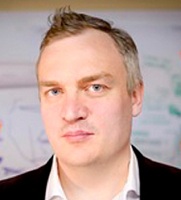NIS International Research-to-Practice Conference
Inspirational Speakers

Keynote Speakers
Pavel Luksha
Pavel Luksha is a Professor at Moscow School of Management at Skolkovo. The School of Management and the Skolkovo Educational Development Centre are conducting a joint project with the Ministry of Education of the Russian Federation and the International Trade Organisation. Since 2014, he has been the leader of Global Education Futures, an international platform for the discussion of perspectives and models of global education for the 21st century. The project is a continuation of the Russian project, Foresight 2035, which Pavel has been leading since 2010. This project, with support from the Russian Agency for Strategic Initiatives has attracted around educational innovators and has participated in the launch of dozens of innovations in the sphere of secondary, professional and technical education. Since 2012, Pavel has been the project leader on forecasting competencies through 2030, and the basis of which the Atlas of New Professions was published in 2014. The collection is one of a number of similar collections on new and potential professions. From 2013-15, in the framework of the cooperation between the Russian Federation and the International Organisation of Labour, Pavel led the international methodological forecasting for a range of developing countries (pilot projects were held in Armenia, Vietnam, Tunisia, Tanzania and South Africa.)
VIII NIS International Conference, 27-28 October 2016: Keynote Speech
What and why we need to teach students in the 21st century: Findings from Global Education Futures and the Center for Curriculum Redesign
The transformation of the global economy and technological society speaks to the fact that the world of the future will differ significantly from the present one. Total digitisation, reconstruction of the industrial and services sectors under the influence automatisation, environmentalism, new models of networked society, will place new demands on the person of the future to possess new knowledge and skills. The most important trend, the acceleration and intensification of changes as society gets increasingly complicated, demonstrates how preparing students for the forthcoming changes will be extremely difficult. So the question arises, what and why to teach schoolchildren in the 21st century, in order that school continued to fulfil its educational and nurturing function: familiarisation with the world around us and preparation for adult

